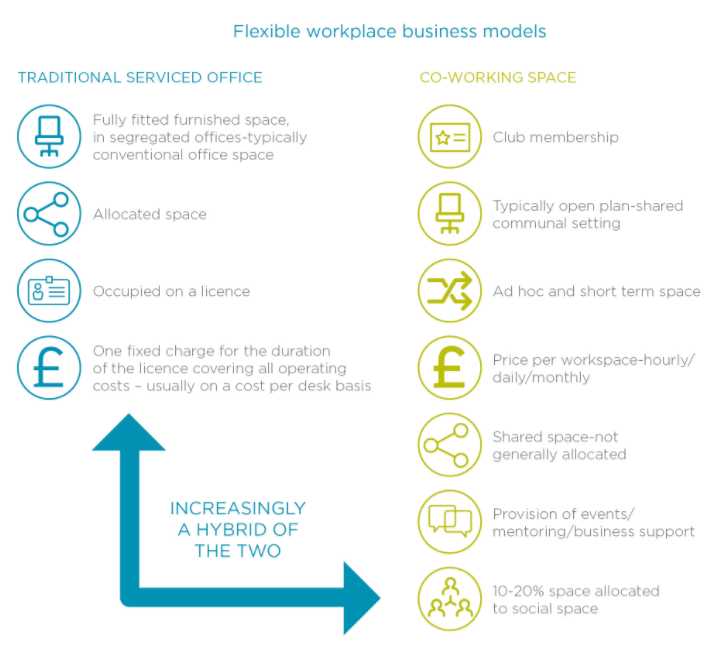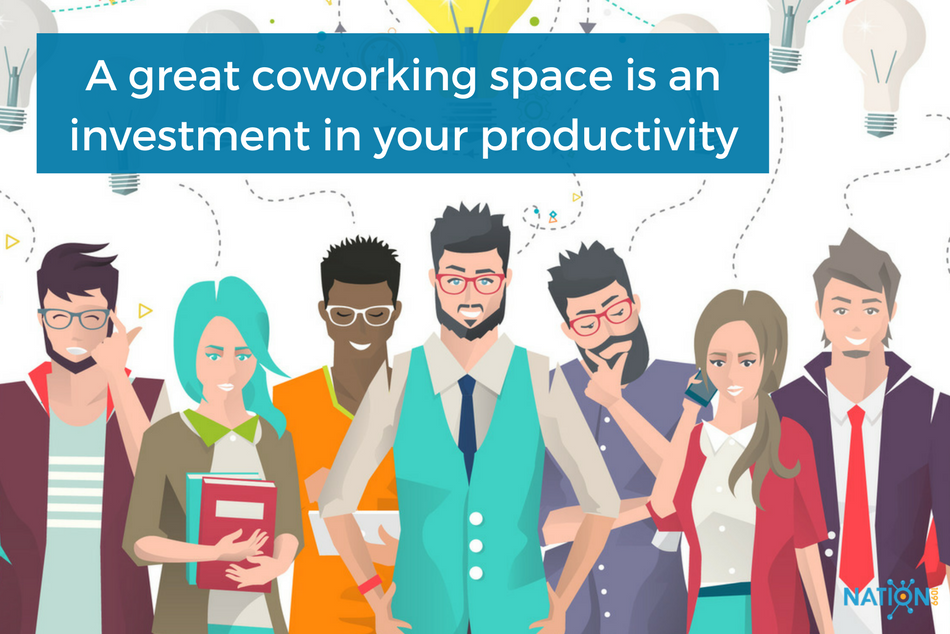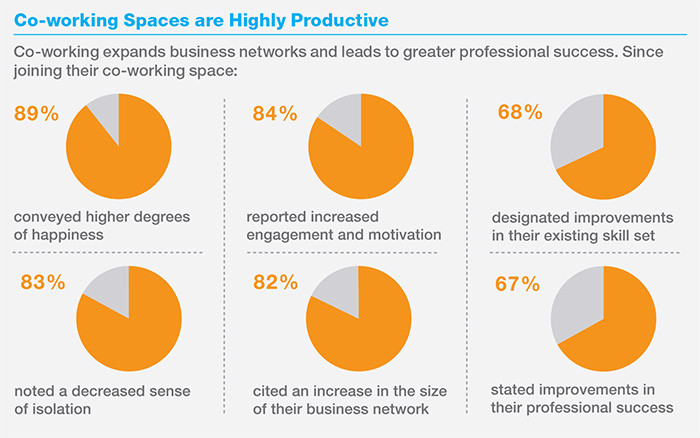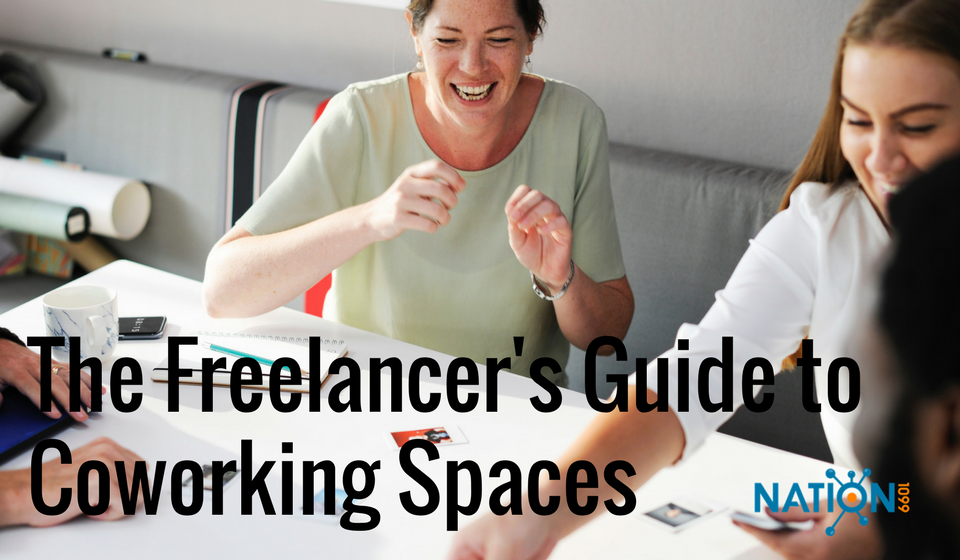If you’re thinking about looking at coworking spaces, you might feel overwhelmed with the options, especially since some of them may be more suited to startups and other small businesses rather than for independent contractors.
Also, you might be reluctant to choose a coworking space because, as a freelancer who is working from gig to gig, your own business model is probably based on near-zero overhead and paying yourself a hundred percent of every contract.
But the expense of a coworking space can make sense for freelancers in some limited situations and even be a boon. In this article, we’ll look at some of the advantages and disadvantages of coworking and gather some of the best advice for finding a space that works for your freelance business.
Check out our coworking space profile series
How This Austin Coworking Space Is Designed For Freelance Creatives
How A Brooklyn Coworking Space Is Building Partnerships and Community
Blankspaces: LA Coworking Space That Celebrate the Freelance Lifestyle
How LAX Coworking Connects Freelancers With a Chamber of Commerce
How Industrious Creates Productive Environments for Freelancers
The growth of coworking represents a change from traditional “serviced office”models to a new “unallocated/shared-space” model for short-term leases. In fact, most coworking spaces include a mix of the two.

Source: Coworking 2018 – The Flexible Workplace Evolves, Cushman Wakefield
Benefit 1: Solidarity, not solitary
“I was thrilled to be my own boss,” says journalist, speaker and author Minda Zetlin. “But as I sat in my apartment staring at my computer, it just seemed so very . . . quiet.”
Is the sound of silence a little too familiar?
The classic “freelance office” is the spare bedroom, which can make freelancing pretty lonely. That solitude is one of the key reasons so many solos burn out. Zetlin captures the creeping sense of isolation some call the “solo blues” very well in an informative piece she wrote for Inc.
“It took me a long time and a lot of experimentation to learn that being on your own as an entrepreneur doesn’t have to mean being isolated,” she says.
But what if we could maintain the benefits an independent lifestyle while working within a productive and supportive community?
A big theme we frequently explore at Nation1099 is that “going independently doesn’t mean you go it alone.”
Mastermind groups and accountability groups help many of us create a healthy support structure for success, but don’t do much to help us in the day-to-day and all of those silent mornings alone. Many of us need work environments that foster a sense of community around us.
One of the best ways to optimize your productivity and expand your network is to find a coworking space.
Benefit 2: Coworking spaces help you treat your freelancing “like a job”
Many freelancers leave the office because they’re tired of the restrictions that accompany 9-to-5 life. But many of us overlook the merit of the schedules that govern the working world. Structure keeps many of us on track. Whether your peak hour is 9 am or 3 am, you still need a regular cycle for your work day and an environment that keeps you productive.
A good coworking space can give you the right mix of flexibility and structure. Many of them have pricing options where you can access the space a certain number of days per month. A 10-day/month plan, for example, can be more affordable than a full membership, and you only have to “go into the office” about 50 percent of the time to get your money’s worth.
Choosing a coworking space lets freelancers:
- create a regular and reliable schedule.
- build your professional network.
- find new collaborators.
- get new work and client referrals.
If your freelance business could benefit from finding new partners, expanding your network and getting inspiration from other innovative people, then it might be worth adding the expense to your budget.

Benefit 3: There’s evidence to back this up
Even though coworking spaces are a newer option, some impressive statistics are already available
According to researchers writing in the Harvard Business Review, employees whose companies use a coworking space report more that they thrive at work than employees in traditional offices. They see their work as more meaningful and themselves as part of a community.
Furniture maker Knoll has an excellent white paper that gather up much of the relevant research on coworking spaces that shows dramatic improvement in skill-building, engagement, motivation and professional success.

Websites that help you choose a coworking space
You don’t have to reside in a big city or hot tech hub. Coworking spaces are popping up almost everywhere. In fact, the chic restaurant down the street may well be the cowork destination in your neighborhood in its off hours. With real estate prices in New York City and other major metros continuing to rise, restaurants and other businesses have opened their doors to solopreneurs as a means of covering mounting expenses.
Wine and work: Innovative startup Spacious offer a city-by-city network of off-hours coworking spaces in popular restaurants and bars for a flat rate of $95 a month.
Coworking wherever you go: If you are a consultant or freelancer who travels a lot, you might wish you could afford to find a coworking space in each city you visit instead of relying on the dreary “business center” at your hotel. There are a growing number of “membership bundlers” that let you pay one membership fee and access coworking spaces around the country. One example is Desktime.
A related model The League of Extraordinary Coworking Spaces (a.k.a. LExC), which is a group of spaces that offer reciprocal memberships within its network.
There are also an increasing number of helpful websites that aggregate best reviewed coworking spaces in cities across the globe and in local areas. Checkout these search engines for coworking spaces (U.S. focused unless otherwise noted) :
- ShareDesk
- Desks Near.Me
- Coworking Wiki
- 42Floors
- DeskSurfing
- OfficeBing – India focused
- Regus
Evaluating coworking spaces

While most coworking spaces attract a diversity of freelancers, no two are exactly alike and even a slight difference in culture can create a completely different work dynamic.
Choosing a coworking space shouldn’t be a rushed decision. We’ll help you weigh your options and find the clear cowork solution that’s best for you in the points below.
These are the crucial criteria that have led some of us to our favorite coworking spaces.
Can you visit and try it before signing?
The best way to get a feel for a coworking space is to spend a day in the life and see how it feels. Many coworking spaces, like gyms, offer one-day visitor passes.
On your visit, ask yourself:
- Is the space too noisy for you to focus?
- Is there minimal interaction between coworkers?
- Is there enough furniture without it feeling like rummage sale?
- Are the “cool perks” too distracting?
Lastly, are the “cool people” not distracting enough because they’re too cool to interact with one another? Personal boundaries are nice, but a coworking space should feel like a community. We’ve visited clients at their coworking spaces where small teams from each company stay in their own glass-walled offices and never talk to anyone outside. That doesn’t do a freelancer much good.
There are many factors that you won’t anticipate until you’ve put a cowork space to the test and evaluated it in person.
What are the people like?
For most solopreneurs, culture ranks at the top of their considerations when choosing a coworking space. And it makes sense. Some deride coworking spaces as expensive cures for loneliness.
Of course, you might equally say that offices, middle managers and H.R. departments are an expensive cure for not having the imagination to hire people who can work independently.
The engaged and communal environment of a good coworking space can be worth the price of admission, and having some money on the line and some people expecting to see us regularly, helps many of us take our commitments more seriously.
But to access these benefits and get the most bang for your buck, you need to pay very close attention to the kinds of professionals a coworking space attracts.
When trying out a space ask yourself:
- How productive do the people seem to be around you?
- Are they positive and encouraging to be around?
- Do they seem passionate about what they’re doing?
- Do they work in adjacent industries where collaboration might be possible?
- Are they interested in knowing their fellow coworkers?
How much does a coworking space costs, and what are you getting?

Coworking spaces vary greatly in size, location and amenities. For a freelancer, your choices are often between a dedicated desk, a shared desk or a “hot desk.” Hot desks are a group of unreserved “grab anything that’s open” spaces. Within this range, the average costs range between $200 and $550 a month, depending, of course on your city’s real estate market.
You may have options for more affordable X times/per month memberships as we discussed above.
And there are certainly more luxurious options available like single offices that will cost you closer to the $700-$1000 range. This coworking option can be good for consultants who need to meet clients sometimes.
Do they have the resources and accessibility you need?
While a small desk may be fine most days, perhaps you occasionally need to meet with clients or have team huddles to strategize with your fellow freelancers. This is one of the upsides of coworking spaces. Yours should give you the flexibility to access these other resources on a limited basis.
Beyond the basics, you may want to make sure your space has:
- Closed conference rooms available for reservation
- 24 hour access
- Attentive staff on premises
Lastly, when choosing a coworking space, you need to consider the hours of operation. If they are open 24 hours, no sweat. But some of the more affordable places will only be open for a narrower range closer to traditional business hours. If your working style is to sit down for 16 hours every day for weeks until a project is done, those limited hours won’t work for you.
Know how you work best and be clear on the factors you need for optimal results
While kegs, table tennis and a big common room might be enticing perks when choosing a coworking space, these features may not be the most conducive to your best productivity. Remember your distraction triggers and gauge whether the chicest coworking space will actually be the best arrangement for your needs.
Don’t forget, you are paying to be there — not to crown yourself the undisputed foosball champion.
Choosing a good coworking space means finding a home base for your work that gives you necessary sense of community, expands your professional network and gives you a formal place for your independent business to thrive.

Ben Shanbrom is a freelance writer, musician and copy editor who works with artists and other clients around his native New Haven and well beyond.











